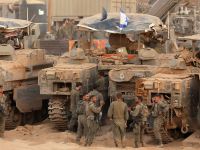By Jon Pattee
Senior English Editor
Albawaba.com - Amman
From the Internet to front page news, the court of public opinion holds daily sessions on children caught in wars worldwide. But which children win praise, and which are condemned, seems to depend mostly on who spins the news.
Nowhere is this more evident than the media battle over the Israeli-Palestinian conflict, in which the Palestinians are accused of sending their children to certain death in clashes with Israeli soldiers.
But children in general, and Palestinian children in particular, are no strangers to war, a fact borne out by Amnesty International research. Amnesty estimates that Palestinian children share the global battlefield with 300,000 “child soldiers.”
In one critical respect, however, Palestinian children are not child soldiers at all – for unlike their well-armed peers from Uganda to Cambodia, few, if any, wield more than stones.
The stakes of the controversy over Palestine’s war children are high: Reuters has quoted a UN investigator to the Palestinian territories as saying that the scale of Palestinian deaths at the hands of Israeli forces in just 20 days of last fall was “unprecedented.” And the latest BBC estimates put the number of Palestinians killed at some 425, compared to Israeli losses of about 88 in the same period. Human Rights Watch has characterized the situation as “repeated Israeli use of excessive lethal force in situations where demonstrators were unarmed and posed no threat of death or serious injury to the security forces or others.”
But the debate over who is to blame for these deaths, which daily boils across the Internet, airwaves and printed page, seldom delves into whether history and reality jibe with the spin doctors’ take on events.
WAR CHILD: ISRAELI ATTITUDES VS. HISTORY
Israeli leaders condemn their foes’ war children, but are slow to acknowledge that child soldiers helped put their nation on the map.
“Youth movements provide an opportunity for teenagers to put their feelings and ideals into action…” reads the Jewish Virtual Library’s section on “Youth Movements,” which describes in glowing terms the Zionist Hehalutz youth movement that “formed the activist core of fighters in ghetto uprisings and Jewish partisan units, as well as in the Beriha (immigration to Palestine) movement after the Holocaust.”
This kind of praise for the heroism of Jewish youth on the battlefield is not reserved for organizations. Young Israelis have often been lauded for their presence on the ramparts, not least by Israeli author Shulamit Aloni, who wrote: “During the War of Liberation in 1948 I was in the battle for the Old City of Jerusalem – and men and women, girls and boys, fought side by side.”
Meanwhile, many of Israel’s most famous soldiers got started in their teens, including Ehud Barak, the former Israeli prime minister who enlisted in the Israeli armed forces at the age of 17.
Another standout is Israeli Prime Minister Ariel Sharon, who, according to the Jewish Virtual Library, joined the Jewish underground military organization Haganah at the age of 14. Haganah’s special forces, according to military historian Dr. Uri Milstein, participated in the 1948 attack on the village of Deir Yasin, in which at least 120 Palestinian men, women and children were killed.
But Sharon’s latest statements indicate that he has altered his views since his days as a child soldier.
“Since the beginning of the clashes in late September, under both Sharon and Barak as prime ministers, Israel has condemned the use of children in the front line of the clashes,” said Roey Gilad, press counselor for the Israeli Embassy in Jordan.
Sharon himself, in an April 18 interview with the Israeli paper Haaretz, characterized Palestinian Yasser Arafat’s alleged role in “sending children to the front” as “disgusting.”
WHO HATES MORE?
Official Israeli accounts emphasize the violent and hate-filled ideology they claim is the main motivation for young Palestinians in the streets.
Young Israelis who take up arms are patriots, they assert. In contrast, Palestinian children allegedly take to the streets under their parents’ pressure, and because they have been raised to hate Jews, glorify martyrdom for Islam, and support the creation of an independent Palestinian country.
This analysis ignores the deep frustrations of Palestinian youth after decades of Israeli military occupation. It also brushes off the rage, as noted by CNN coverage, sparked by the famous footage of Israeli soldiers shooting 12-year-old Mohammad Ad Durra to death in his father’s arms.
But even taking Israeli charges at face value, there is nevertheless the flip side of the coin. Israelis themselves are raised in a culture of “defense and war” from an early age, a phenomenon examined in “Tsahal,” a documentary about the Jewish state’s armed forces.
As reported in an article by Joseph Berkofsky in the Jewish Bulletin of Northern California, “Tsahal,” whose title is actually the Hebrew acronym for the Israeli Armed Forces, examines the army’s heavy influence on Israeli society, not least among its youngest members.
The article notes the film’s point that Israeli boys begin vying for spots in elite units at the age of 17, when they take army physicals and compare profiles. Israeli girls, meanwhile, say the readiness for war is constant.
In terms of climate and ideology, many of the most prominent Israeli leaders level verbal public attacks on Arabs in a way that rivals the most fiery anti-Jewish sermons by Muslim clerics.
Rabbi Ovadia Yosef, the spiritual leader of the important religious political party Shas, has become well-known for labeling Arabs as “vipers” whom God regrets creating, and who should be wiped out with rockets. Other top Israeli leaders have compared Arabs to “cockroaches,” “grasshoppers” and other vermin.
Such statements by Israel’s ostensible role models raise this question: Who is actually guilty of inculcating young people with a violent ideology?
HISTORY IS WRITTEN…
Spinning the debate over whose children have a right to take to the battlefield, and with what motivations, became pressing for Israel when Palestinian children marched in the streets in the 1987 Intifada.
But the urgency has increased ever since the toll of Palestinian children shot dead by Israeli soldiers began soaring several months ago.
In light of these killings, and in contrast with Israeli praise for Jewish youth’s battlefield heroics, an article by the Embassy of Israel posted on aish.com condemns the Palestinians’ “deliberate use of children in armed conflict” as “entirely against international law.”
The embassy article, which casts the deaths of Palestinian children as a “Sympathy Ploy,” asserts that Palestinian President Yasser Arafat “would have the world believe that Israel, with its guns and helicopters, is waging a war against 10-year-olds with small stones…in truth, however, the children are… the smoke screen masking the gunmen, petrol-bomb throwers and lynch mobs which have exacted their pound of Jewish flesh, unseen or ignored by the television cameras and the media crews.”
Moreover, the article says, “with regard to child civilians, the IDF (Israeli Defense Force) respects international law regulating the treatment of civilian populations, (including, of course, children) during the conduct of hostilities. These basic principles…limit the means of injury, distinguish between the civilian population and those participating in the hostilities..and prohibit reprisals against civilians…”
In a problem that mirrors the larger debate, distinguishing between “soldiers” and “civilians” is actually something of an issue in the Israeli article itself, whose headline, “Children Soldiers,” sports a photo of a Palestinian child waving a toy gun with a bright red plastic muzzle. Despite the eye-grabbing headline and photo, nowhere in the text of the article is it even asserted that Palestinian children on the front lines are armed.
Spokesmen seem to measure their success by the degree to which life imitates spin. In this regard, it is perhaps worth noting a World News report from Radio Australia, sourced to ABC Online, recounting how “Israeli troops shot dead a nine-year-old boy in the West Bank town of El Bireh” after opening fire on a group of children playing with toy guns.
As the debate rolls on, Amnesty International reports that Israeli soldiers have killed nearly 100 Palestinian children since last October.







